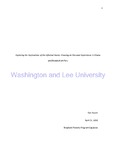Exploring the Implications of the Informal Sector: Drawing on Personal Experiences in Ghana and Research on Peru

View/
Author
Austin, Dan
Subject
Washington and Lee University -- Capstone in Shepherd Program for the Interdisciplinary Study of Poverty and Human Capability
Ghana
Informal sector (Economics)
Otro sendero (Soto, Hernando de)
Peru
Child labor
Child welfare
Metadata
Show full item recordDescription
Capstone; [FULL-TEXT FREELY AVAILABLE ONLINE] Daniel B. Austin is a member of the Class of 2010 of Washington and Lee University. Ultimately, the informal sector refers to the individuals and organizations that operate outside the scope of the legal system. Because the informal sector does not have strict entry barriers, essentially anyone can participate. In addition, informal employers can make decisions at their own discretion, as the legal system does not govern these activities. Perhaps the economy's most troubling issue is tax implementation. Since the informal enterprises are unregistered and unknown, they are essentially non-taxable entities. Thus, the government is deprived of important tax revenues due to the sector's nature. And the pervasive nature of the informal economy further magnifies these issues. It can comprise up to sixty plus percent of a nation's labor force. Selling simple goods and services can be more profitable in the informal economy than its formal counterpart. The informal sector and the problems it creates deserve further exploration. [From Introduction and Background Information] Dan Austin